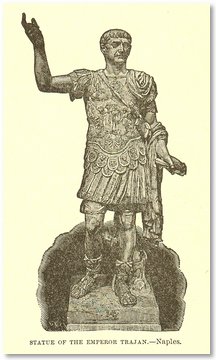
The Emperor Trajan

TRAJAN, Marcus Ulpius, emperor of Rome, born near Seville, Spain Sep 18, 59; died in Selinus in July, 117 A. descended from a family of Roman origin and showed early military skill in the campaigns against the Parthians and the Germans on the Rhine, in the reigns of Titus and Domitian. His distinguished services caused his appointment to the consulship in 91, and Nerva created him Caesar in 97.
On the death of the Emperor Nerva, in 98, Trajan returned from Germany and ascended the throne, making large gifts to the Roman citizens and soldiers concluded peace with the German tribes, introduced reforms in the public service, and in 101 led a large army from Rome against the Dacians, making their country a Roman province in 105. While on this foreign campaign, in 103, he directed an epistle to Pliny, governor of Bithynia and Pontus, in which he instructed that official not to heed anonymous charges against Christians.
Trajan entered upon an extensive campaign in the East in 106, annexing Armenia, Parthia
Arabia, Mesopotamia, and other regions. He rossed from the Caspian Sea to the Indian ocean
and was the first Roman to explore the Persian Gulf. The government of Trajan is noted as
one of the most vigorous and efficient of Rome. He adorned Rome with splendid uildings and
bridges, built canals and highways and founded new cities. The Trajan column, a famous
structure still to be seen at Rome, was built to commemorate his victory over the
Germans.
Trajan's wall, extending from the Black sea to the Danube and designed to keep the barbarians out of the empire, is another remarkable work tided in his reign. The The Roman Empire reached its greatest extent under Trajan, and it was said of him that he never permitted a Roman army to be defeated. He founded several libraries at Rome, the most celebrated of which was the Ulpia Bibliotheca. Hadrian succeeded him as Roman emperor.
| Privacy Policy | Site News | About | Site Map |